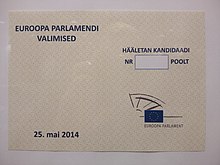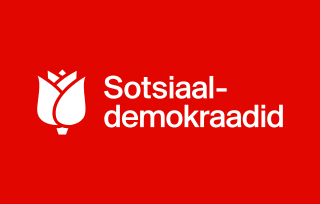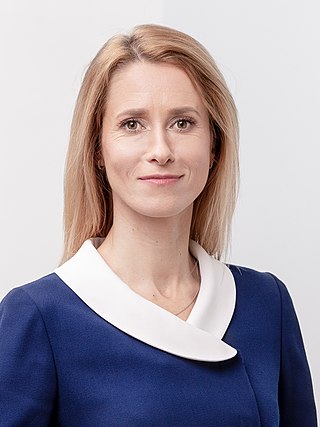| |||||||||||||||||||||||||||||||||||||||||||||||||||||||||||||||||||||||||||||||||||||
All 6 Estonian seats to the European Parliament | |||||||||||||||||||||||||||||||||||||||||||||||||||||||||||||||||||||||||||||||||||||
|---|---|---|---|---|---|---|---|---|---|---|---|---|---|---|---|---|---|---|---|---|---|---|---|---|---|---|---|---|---|---|---|---|---|---|---|---|---|---|---|---|---|---|---|---|---|---|---|---|---|---|---|---|---|---|---|---|---|---|---|---|---|---|---|---|---|---|---|---|---|---|---|---|---|---|---|---|---|---|---|---|---|---|---|---|---|
| Turnout | 36.52% [1] | ||||||||||||||||||||||||||||||||||||||||||||||||||||||||||||||||||||||||||||||||||||
| |||||||||||||||||||||||||||||||||||||||||||||||||||||||||||||||||||||||||||||||||||||

An election for Members of the European Parliament from Estonia to the European Parliament was held on 25 May 2014.
| |||||||||||||||||||||||||||||||||||||||||||||||||||||||||||||||||||||||||||||||||||||
All 6 Estonian seats to the European Parliament | |||||||||||||||||||||||||||||||||||||||||||||||||||||||||||||||||||||||||||||||||||||
|---|---|---|---|---|---|---|---|---|---|---|---|---|---|---|---|---|---|---|---|---|---|---|---|---|---|---|---|---|---|---|---|---|---|---|---|---|---|---|---|---|---|---|---|---|---|---|---|---|---|---|---|---|---|---|---|---|---|---|---|---|---|---|---|---|---|---|---|---|---|---|---|---|---|---|---|---|---|---|---|---|---|---|---|---|---|
| Turnout | 36.52% [1] | ||||||||||||||||||||||||||||||||||||||||||||||||||||||||||||||||||||||||||||||||||||
| |||||||||||||||||||||||||||||||||||||||||||||||||||||||||||||||||||||||||||||||||||||

An election for Members of the European Parliament from Estonia to the European Parliament was held on 25 May 2014.
| Date | Polling firm | Centre | Tarand | Reform | IRL | SDE | Greens | EKRE | EIP | Others | ||
|---|---|---|---|---|---|---|---|---|---|---|---|---|
| 25 May 2014 | Election results | 22.4 | 13.2 | 24.3 | 13.9 | 13.6 | 4.0 | 1.3 | 7.4 | |||
| 17 May 2014 | TNS Emor | 22 | 15 | 19 | 17 | 19 | 4 | 1.6 | 5 | |||
| 19 April 2014 | TNS Emor | 16 | 11 | 16 | 17 | 16 | 3 | |||||
| 7 June 2009 | Election results | 26.1 | 25.8 | 15.3 | 12.2 | 8.7 | 2.7 | 2.5 | 2.23 | 1.8 | – | 2.6 |
1 Not running independently in the elections.
2 Not running in the elections.
3 As People's Union of Estonia
| Party | Votes | % | Seats | +/– | |
|---|---|---|---|---|---|
| Estonian Reform Party | 79,849 | 24.31 | 2 | +1 | |
| Estonian Centre Party | 73,419 | 22.35 | 1 | –1 | |
| Pro Patria and Res Publica Union | 45,765 | 13.93 | 1 | 0 | |
| Social Democratic Party | 44,550 | 13.56 | 1 | 0 | |
| Conservative People's Party of Estonia | 13,247 | 4.03 | 0 | 0 | |
| Estonian Independence Party | 4,158 | 1.27 | 0 | New | |
| Estonian Greens | 986 | 0.30 | 0 | 0 | |
| Estonian United Left Party | 226 | 0.07 | 0 | 0 | |
| Independents | 66,293 | 20.18 | 1 | 0 | |
| Total | 328,493 | 100.00 | 6 | 0 | |
| Valid votes | 328,493 | 99.61 | |||
| Invalid/blank votes | 1,273 | 0.39 | |||
| Total votes | 329,766 | 100.00 | |||
| Registered voters/turnout | 902,873 | 36.52 | |||
| Source: VVK | |||||
Politics in Estonia takes place in a framework of a parliamentary representative democratic republic, whereby the Prime Minister of Estonia is the head of government, and of a multi-party system. Legislative power is vested in the Estonian parliament. Executive power is exercised by the government, which is led by the prime minister. The judiciary is independent of the executive and the legislature. Estonia is a member of the United Nations, the European Union, and NATO.

Euroscepticism, also spelled as Euroskepticism or EU-scepticism, is a political position involving criticism of the European Union (EU) and European integration. It ranges from those who oppose some EU institutions and policies, and seek reform, to those who oppose EU membership and see the EU as unreformable. The opposite of Euroscepticism is known as pro-Europeanism, or European Unionism.

The history of Estonia forms a part of the history of Europe. Humans settled in the region of Estonia near the end of the last glacial era, beginning from around 8500 BC.

Siim Kallas is a Soviet and Estonian politician, former Prime Minister of Estonia, and former European Commissioner and a former member of the Communist Party of the Soviet Union. He served as the European Commissioner for Transport between 2010 and 2014. Before that he was the European Commissioner for Administrative Affairs, Audit and Anti-Fraud between 2004 and 2009. In both Barroso Commissions he was also a Vice-President. He was twice appointed the Acting Commissioner for Economic and Monetary Affairs and the Euro in Olli Rehn's stead, from 19 April 2014 to 25 May 2014 while he was on electoral campaign leave for the 2014 elections to the European Parliament and from 1 July 2014 to 16 July 2014 after he took up his seat.

Christian Union – Reformed Political Party is a parliamentary common list for the European Parliament formed by two Dutch orthodox Protestant parties: the Christian Union and the Reformed Political Party. Both parties are eurosceptic and morally conservative, and each has candidates on the common list. The CU and SGP also regularly co-operate in municipal elections, often gaining above-average results in municipalities which form part of the Dutch Bible Belt.

The Estonian Centre Party is a populist political party in Estonia. It was founded in 1991 as a direct successor of the Popular Front of Estonia, and it is currently led by Jüri Ratas.

The People's Union of Estonia was a political party in Estonia. Its last leader was Margo Miljand.

The Estonian Reform Party is a liberal political party in Estonia. The party has been led by Kaja Kallas since 2018. It is colloquially known as the "Squirrel Party".

A European political party, known formally as a political party at European level and informally as a Europarty, is a type of political party organisation operating transnationally in Europe and within the institutions of the European Union. They are regulated and funded by EU Regulation No. 1141/2014 on European Political Parties and European Political Foundations and their operations are supervised by the EU Authority for European Political Parties and European Political Foundations. Europarties - usually made up of national parties, not individuals - have the exclusive right to campaign during the European elections and express themselves within the European Parliament by their affiliated political groups and their MEPs. Europarties influence the decision-making process of the European Council through coordination meetings with their affiliated heads of state and government. They also work closely and co-ordinate with their affiliated members of the European Commission.

The Social Democratic Party is a centre-left political party in Estonia. It is currently led by Lauri Läänemets. The party was formerly known as the Moderate People's Party. The SDE has been a member of the Party of European Socialists since 16 May 2003 and was a member of the Socialist International from November 1990 to 2017. It is orientated towards the principles of social-democracy, and it supports Estonia's membership in the European Union. From April 2023, the party has been a junior coalition partner in the third Kallas government.

Parliamentary elections were held in Estonia on 2 March 2003. The newly elected 101 members of the 10th Riigikogu assembled at Toompea Castle in Tallinn within ten days of the election. Two opposing parties won the most seats, with both the Centre Party and Res Publica Party winning 28 seats in the Riigikogu. Res Publica was able to gain enough support in negotiations after the elections to form a coalition government.

Parliamentary elections were held in Estonia on 7 March 1999. The newly elected 101 members of the 9th Riigikogu assembled at Toompea Castle in Tallinn within ten days of the election. The elections proved disastrous for the ruling Estonian Coalition Party, which won only seven seats together with two of its smaller allies. Following the elections, a coalition government was formed by Mart Laar of the Pro Patria Union, including the Reform Party and the Moderates. It remained in office until Laar resigned in December 2001, after the Reform Party had left the same governing coalition in Tallinn municipality, making opposition leader Edgar Savisaar new Mayor of Tallinn. The Reform Party and the Estonian Centre Party then formed a coalition government that lasted until the 2003 elections.

Andrus Ansip is an Estonian politician, a member of the European Parliament, the former European Commissioner for Digital Single Market and Vice President of the European Commission, in office from 2014 until 2019. Previously, he was Prime Minister of Estonia from 2005 to 2014 and chairman of the liberal Estonian Reform Party from 2004 to 2014.

Urmas Paet is an Estonian politician and Member of the European Parliament (MEP) from Estonia. He is a member of the Reform Party, part of the Alliance of Liberals and Democrats for Europe. He has served as Minister of Foreign Affairs from 2005 to 2014 and Minister of Culture from 2003 to 2005. He was a member of the Estonian Parliament from 2003 to 2014.

Isamaa is a Christian-democratic and national-conservative political party in Estonia.

Marina Kaljurand is an Estonian politician and Member of the European Parliament. Kaljurand served as Minister of Foreign Affairs in Taavi Rõivas' second cabinet as an independent. Earlier, she served as the Ambassador of Estonia to the United States, Russia, Mexico, Canada, Kazakhstan, and Israel.
An election for Members of the European Parliament from Estonia to the European Parliament was held on 7 June 2009.

A parliamentary election was held in Estonia on 6 March 2011, with e-voting between 24 February and 2 March 2011. The newly elected 101 members of the 12th Riigikogu assembled at Toompea Castle in Tallinn within ten days of the election. The incumbent government of the Reform Party and IRL continued in office until 2014 when Prime Minister Andrus Ansip resigned, ending his tenure as the longest-serving Prime Minister in contemporary Estonian history. He was replaced by Taavi Rõivas who formed a new coalition government with SDE. The Riigikogu elected after this election was the least fragmented in Estonian history, featuring only four parties.

Kaja Kallas is an Estonian politician who has been prime minister of Estonia since 2021, and is the first woman to serve in the role. The leader of the Reform Party since 2018, she was a member of parliament (Riigikogu) in 2011–2014, and 2019–2021. Kallas was a member of the European Parliament in 2014–2018, representing the Alliance of Liberals and Democrats for Europe. Before her election to Riigikogu, she was an attorney specialising in European competition law.

An indirect election took place in Estonia in 2016 to elect the president of Estonia, who is the country's head of state. The Riigikogu — the Parliament of Estonia — elected Kersti Kaljulaid to be the next head of state of Estonia to succeed Toomas Hendrik Ilves, who had served his second and final term as president. Kaljulaid is the first female head of state of Estonia.